-
Home
-
2017 - Another Year Bites the Dust
2017 - Another Year Bites the Dust
January 23, 2018
2017 has been a whirlwind kind of year. Each week proving to be different and more jam packed than the previous one, and the trend continues up to the day I write this. As the new year approaches, it is important to reflect on 2017, the good the bad and the ugly, and to plan for 2018, the good the better and the beautiful.
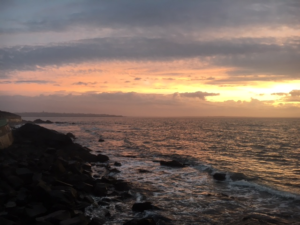
2017...the good. We planted more oysters than we ever have, and the farm has a huge inventory of 3.5 - 4" salty, briny, Virginicas that will keep us stocked through the winter and spring all the way into the summer. So, to the customers reading this, Buy, Buy, Buy! QBU’s!
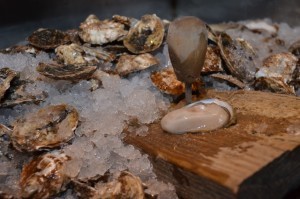
Quonsets
We purchased a brand-new-to-Salt Water Farms work barge/boat/US Navy destroyer thing that will put us on a new level. Once it is fitted out it will resemble a Kiwi mussel farming boat complete with gantry cranes, and mega star wheels. “The Innovator” will have similar capabilities to the Thomas D. Royal, but it is a bulkier (weighing 3 times as much) aluminum design that can do more heavy lifting.
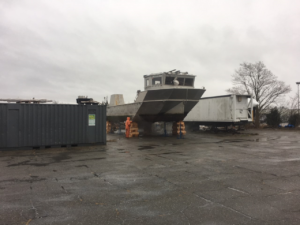
The bad. Hurricane season, while being epic for New England surfers, was not so epic for the offshore oyster farm. We lost our entire crop of Newport Cup Oysters due to the massive swells rolling into Rhode Island consistently starting in August and through the middle of October (I am not complaining about the waves though check out this page! https://vibbi.com/twocamsam). The lessons we learned were valuable; beef up our oyster sets and how they attach to the longline, and never underestimate the power of the ocean!
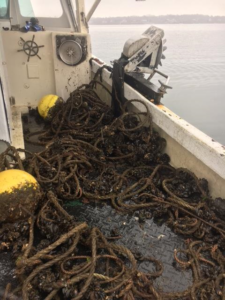
The ugly. Political antics is what comes to mind first, but this blog is about real life, not fake news or who's probing who. So, we cleaned up our oyster farm off of Jamestown, put some new anchors in, and finally after four years of limping along at one sixth of our capacity at that site we will have a fully operational farm for 2018. Of course, we still need to reinstall the longlines we removed; removing the longlines was the ugly part because they were covered in mussels and biofouling that filled the TDR as we pulled them into the boat. That's the best ugly I can think of without straying to far off topic.
So, with a few parts of 2017 highlighted, I can look back and realize how few I actually talked about. The year flew by with a steady work load of tumbling, planting, replanting, mussel planting, and mussel harvesting. Those activities are the “nuts and bolts” of Salt Water Farms and get more fine tuned each year. I will leave 2017 at that, if the reader needs more details ask to see the TDR log book; docked in Quonset Point RI.
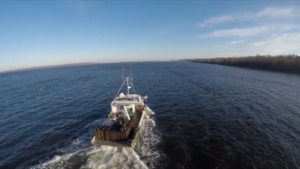
2018...the good. The Innovator will play a crucial role in increasing the capacity of our oyster farm. In years past, we struggled to keep up with the maintenance end of oyster farming. We would be flat out from April through October trying to stay on top of harvesting, bio-fouling mitigation, and whatever other side projects we could fit in the mix. Now we can have two boats kicking butt all summer, which will have a significant effect on our production capabilities for oysters, mussels and other projects on the farm.
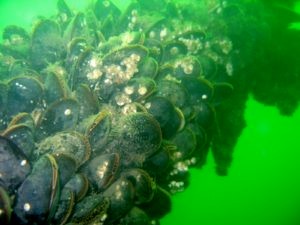
The better. We have beat the ducks (I know I will regret writing this). By planned planting and proper placement, we believe 2018 will yield a bumper crop of mussels. Furthermore, we are experimenting with different reseed timings that will hopefully produce a fall to winter crop of Blue Gold mussels bringing us closer to a year-round crop of these outstanding mussels, or the holy grail of shellfish farming in Southern New England waters.
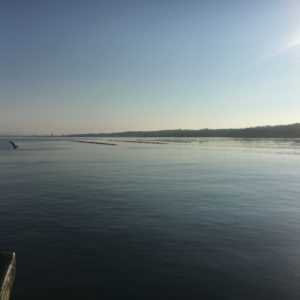
The beautiful. Quonset Point, Beaver Tail, and Umami oysters. Our bread and butter just keeps getting better. The more you handle your oysters the better you get to know them, and the end result is a well-rounded oyster that is "deep and introspective." Maybe we can use that line to describe the flavor profile it’s on par with like some of the other descriptions I’ve seen lately, "apples or mushrooms?" C'mon. I still prefer the old fashioned, "like kissing a mermaid." Anyway, all the energy we spend practicing good husbandry pays off in the final product. We are out there year-round with our oysters through the nasty New England nor’easters, the bitter cold winter, the blazing summer sun and whatever weather comes our way. It's not always bad conditions on the farm, but we are always there practicing our craft, honing in on what works, driving, thriving and scuba diving.